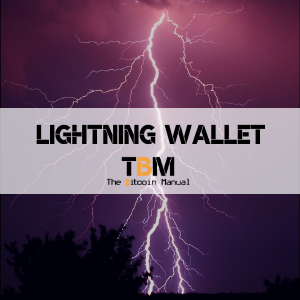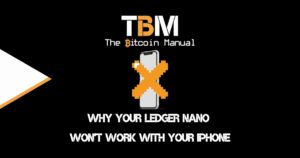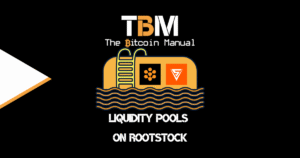Lightning Wallet
Home » Storage & Security » Lightning Wallet
A lightning network-enabled wallet is an app or program that allows you to send and receive Bitcoin using the second layer protocal. The wallet will keep track of your BTC balance on the lightning network and, in some cases, on the main chain too.
The Bitcoin shown in this wallet can be held in one or more bitcoin addresses along with your transaction history.
The wallet controls access to a user’s money, manages keys and addresses, tracks balance, and creates and signs transactions.
The lightning network enables instant and near 0 fee Bitcoin transactions, and to experience the benefits of these features, you need a lightning wallet. There are various providers of lightning wallets, and the non-custodial versions you a lightning wallet attached to a Bitcoin main chain seed phrase that you will want to keep in a safe place.

To receive satoshis, you will need to create an invoice (LN URL) or QR code in your lightning wallet app and send this to the person paying you. They then scan the QR code with their lightning wallet app, confirm the transaction, and the sats will be sent instantly.
How a lightning wallet functions
A wallet is the most common user interface to the Bitcoin and Lightning system; think of it as a web browser for your money. Wallets manage public and private keys, track balances, and create and sign transactions. Some lightning wallets only allow you to transact on the Lightning Network, while others allow you to manage both the main-chain and Lightning accounts.
There are various degrees of control depending on your technical ability and the level of control you want over your wallet.
Keys are often stored in a digital wallet on each user’s computer or smartphone. Possession of the key that can sign a transaction is the only prerequisite to spending bitcoin, putting the control entirely in the hands of each user.
Lightning-enabled wallets
On Lightning, wallets establish channels, calculate routes on the network, manage channel opening and closing, and in some cases, ensure constant uptimes. Wallets are one of the most actively developed applications in the Bitcoin and Lightning ecosystem. There is intense competition, and wallet adoption is an essential element to user adoption. Choosing a wallet is highly subjective and depends on user experience.
Desktop wallet
A desktop wallet runs on Windows, macOS, or Linux. Often running a complete Bitcoin and Lightning node, desktop wallets are the most common in the Lightning Ecosystem as LN requires constant uptime to maintain channels.
Mobile wallet
Mobile wallets for Lightning run on iOS and Android. Many mobile wallets for Lightning are currently under development, and there are several options available for both custodial, non-custodial and privacy-focused users.
Hardware wallet
Hardware wallets operate self-hosted Bitcoin and Lightning nodes on special hardware. By handling all Bitcoin and Lightning related operations on the hardware, hardware wallets can operate with high uptimes and can enable high levels of security.
Web wallet
Web-based wallets are functioning Lightning wallets that can be used in a browser, as a desktop app or a web service. These apps come in several forms and are designed to make managing your transactions from your desktop or laptop easier.
Lightning wallet implementations
Non-custodial lightning wallet
A non-custodial wallet is one where you have sole ownership of the keys to the wallet and there is no third party who can access to manage your keys on your behalf.
You use your keys to sign transactions that establish channels onto the lightning network and can use those keys to close channels and pull Bitcoin back into the main chain whenever you want.
Full-node client
A full client, or “full node,” is a client that stores the entire history of bitcoin transactions (every transaction by every user, ever), manages users’ wallets, and can initiate transactions directly on the bitcoin and Lightning network. A full node handles all aspects of the protocol and can independently validate the entire blockchain and any transaction. A full-node client consumes substantial computer resources (e.g., more than 125 GB of disk, 2 GB of RAM) but offers complete autonomy and independent transaction verification.
Lightweight client
A lightweight client, also known as a simple-payment-verification (SPV) client, connects to bitcoin full nodes or uses protocols like neutrino for access to the bitcoin transaction information but stores the user wallet locally independently creates, validates, and transmits transactions. Lightweight clients interact directly with the bitcoin network without an intermediary.
Custodial lightning wallet
Custodial wallets are similar to banking apps; you do not have full control over your Bitcoin but rather access it via a third-party service. These third-party services manage all the technical aspects of the transactions, making it easier for users. They leverage API clients to interact with bitcoin or Lightning. The API client acts as a third-party system of application programming interfaces (APIs) rather than by connecting to the bitcoin network directly. The wallet may be stored by the user or third-party servers, but all transactions go through a third party.
Bitcoin lightning wallet options
| Wallet | Mobile | Desktop | Custodial | Link |
| Bitcoin Jungle | iOS/Android | N/A | Yes | https://bitcoinjungle.app/ |
| Blink Wallet (Formally Bitcoin Beach Wallet) | iOS/Android | N/A | Yes | https://www.blink.sv/ |
| Blixit Wallet | iOS/Android | N/A | Yes | https://blixtwallet.github.io/ |
| Blue Wallet | iOS/Android | macOS | No | https://bluewallet.io/ |
| Breez | iOS/Android | No | https://breez.technology/ | |
| Éclair | Android | No | https://github.com/ACINQ/eclair-mobile | |
| Lexe Wallet | iOS | N/A | No | https://lexe.app/ |
| LNLink | iOS | N/A | No | https://jb55.com/lnlink/ |
| Mutiny | iOS/Android | N/A | No | https://mutinywallet.com/ |
| Muun | iOS/Android | N/A | No | https://muun.com/ |
| Nayuta | iOS/Android | N/A | No | https://nayuta.co/wallet/ |
| Open Bitcoin Wallet | Android | N/A | No | https://play.google.com/ |
| Phoenix | iOS/Android | N/A | No | https://phoenix.acinq.co/ |
| Speed Wallet | iOS/Android | N/A | Yes | https://www.speed.app/ |
| Simple Bitcoin Wallet | Android | N/A | No | https://lightning-wallet.com/ |
| Sudonym | iOS/Android | N/A | No | https://sudonym.app/ |
| Valet Wallet | Android | N/A | No | https://play.google.com/ |
| Wallet of Satoshi | iOS/Android | N/A | Yes | https://www.walletofsatoshi.com/ |
| Zap | iOS/Android | MacOS, Linux, Windows | No | https://zaphq.io/ |
| Zebedee | iOS/Android | Internet browser extension | Yes | https://zebedee.io/wallet |
| Zeus Wallet | Android | N/A | No | https://zeusln.app/ |
Share with a friend
If you thought this information was helpful why not share it on your favourite social media network and encourage others to learn more about Bitcoin
The latest news from our blog

Why Your Ledger Nano S Won’t Work with Your iPhone
If you’re a Bitcoin holder using an iPhone and own a Ledger Nano S and Ledger Live, you’ve likely discovered a frustrating reality: these popular

What Are Liquidity Pools On Rootstock?
The decentralised finance (DeFi) space has primarily remained in the hands of altcoin chains, promoters claim to have brought innovative financial instruments to the broader

The Stablecoin Lifeline
Why Altchains Will Survive Despite Native Token Devaluation The altcoin landscape has changed compared to previous cycles, despite many a bag holder still clinging onto
